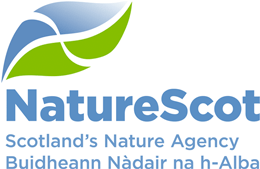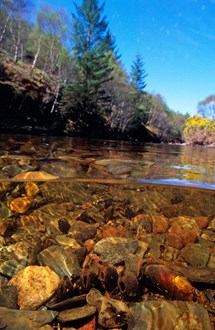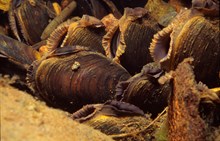17 December, 2015
Latest survey shows declining pearl mussel numbers
Freshwater pearl mussels may now be extinct from several rivers in Scotland, a major new survey from Scottish Natural Heritage (SNH) has confirmed.
Scotland has 114 rivers and burns that continue to support many of the world's most important remaining populations of freshwater pearl mussels. The species is one of the UK’s rarest fresh water molluscs and was first surveyed in 1998 with low numbers reported in many rivers at that time.
The new SNH report has found freshwater pearl mussels are absent in 11 Scottish rivers where they were previously recorded, and that pearl mussels appear to be declining nationwide. The prime culprits are illegal pearl fishing, low numbers of host fish, climate change, poor water quality, and river alterations.
Of the 114 rivers with pearl mussels, the majority continue to show signs that the pearl mussel populations are breeding. These are the sites where conservation efforts are actively being focussed.
SNH and PAW Scotland have created maps identifying crime hotspots and are working with Police Scotland to target illegal pearl fishers. The maps highlight 33 incidents of criminality from 2010 to 2014, and identify the areas in which most criminal activity has taken place. Police Scotland is now focusing its efforts on these areas.
Iain Sime, SNH’s freshwater and wetlands advisor, said:
“This is disappointing news about a species that is on the brink in parts of Scotland. Through the Pearls in Peril LIFE+ project we are working with partners including fishery trusts, SEPA and the forestry sector, to take action to improve conditions for pearl mussels in many rivers.
“But to tackle illegal pearl fishing, continued monitoring of known hot spots is crucial to at least halt the rate of decline. We would ask anyone who sees anything suspicious to report it to Police Scotland immediately.”
Environment Minister and PAW Scotland Chair, Dr Aileen McLeod, said:
“Scotland has a special responsibility to protect freshwater pearl mussels, with a significant proportion of the world’s population living in our rivers. The decline in their numbers is clearly a cause for concern.
“I welcome the efforts of Scottish Natural Heritage, Police Scotland and other PAW partners in tackling the problems threatening the mussels, and raising awareness of the importance of protecting this species.”
As filter feeders, pearl mussels are extremely vulnerable to water pollution caused by engineering work in rivers, such as the construction of weirs or deepening of pools. Important work to counter these, and other pressures, is already underway in many rivers. Initiatives such as the £3.5m Pearls in Peril LIFE+ project will reduce diffuse pollution and restore river habitat. Other conservation work is also being planned in many other river catchments to improve the species’ conservation. SNH and SEPA have set up a pearl mussel working group to identify and implement further positive actions that can be taken to help the species.
For a summary of the pearl mussel report, see http://www.snh.gov.uk/publications-data-and-research/publications/search-the-catalogue/publication-detail/?id=2395 . View the pearl mussel crime hotspot maps at http://www.gov.scot/Topics/Environment/Wildlife-Habitats/paw-scotland/types-of-crime/fresh-water-pearl-mussels/maps
ENDS
Media queries: For more information, contact SNH press & public relations officer, Vicki Mowat, on 0131 316 2659 or vicki.mowat@snh.gov.uk.
PAW Scotland is the Partnership for Action Against Wildlife Crime in Scotland. It includes law enforcement bodies, land managers, conservationists and government agencies who have come together to tackle wildlife crime.
The presence of pearl mussels in our waters is a sign of purity, as they need clean water to survive. They also depend on the healthy migratory fish – in their first year, they attach themselves to the gills of young salmon and trout. If fish numbers decline, pearl mussels may be unable to complete their unique life cycle.
The mollusc very occasionally bears a pearl. Over the years, this has contributed to the massive declines in their numbers and range. The freshwater pearl mussel is fully protected, making it illegal to disturb, injure, take or kill a freshwater pearl mussel. Despite this protection, the threat continues and the species is a UK wildlife crime conservation priority.
Other results from the survey showed that the pearl mussel population appeared to be unchanged in 79 of 105 watercourses previously surveyed, while there was evidence of substantial decline (either extinction or failure to reproduce) in 20 rivers, including the 11 rivers with no mussels found at all.
The previous national survey of freshwater pearl mussel took place over 1997-98 and produced the first overall picture of the species’ status in Scotland. The results were instrumental in selecting future designated sites, including Special Areas of Conservation (SAC) for freshwater pearl mussel populations.
The current national survey was commissioned by SNH during 2013 to establish the species’ present status and establish any trends in abundance, distribution or threats. A number of new sites have been discovered since the first national survey and these were also included in the current project.
Freshwater pearl mussels are similar in shape to common marine mussels, but grow much larger and live far longer than their marine relatives.
Incredibly, they can live for more than 100 years, making them one of the longest-lived invertebrates. They can grow as large as a human hand and are dark brown to black in colour.
They live at the bottom of clean, fast-flowing rivers, where they can be completely or partly buried in course sand or fine gravel. They feed by drawing in river water and filtering out fine particles. Each day, an adult is able to filter more water than we use in an average shower. In their first year, they harmlessly live on the gills of young salmon or trout.
Contact information
- Name
- SNH Media
- snhmedia@snh.gov.uk
NatureScot is Scotland's nature agency. We work to enhance our natural environment in Scotland and inspire everyone to care more about it. Our priority is a nature-rich future for Scotland and an effective response to the climate emergency. For more information, visit our website at www.nature.scot or follow us on X at https://x.com/NatureScot
’S e NatureScot buidheann nàdair na h-Alba. Bidh sinn a’ neartachadh àrainneachd na h-Alba agus a’ brosnachadh dhaoine gu barrachd suim a chur ann an nàdar. Tha e mar phrìomhachas againn gum bi nàdar na h-Alba beairteach agus gun dèilig sinn gu h-èifeachdach le èiginn na gnàth-shìde. Tha an tuilleadh fiosrachaidh aig www.nature.scot no air X aig https://x.com/NatureScot


